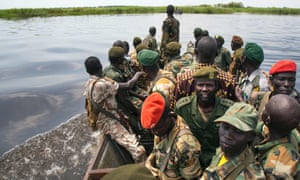
A Sudan People's Liberation Army (SPLA) representative, Brig Gen Lul Ruai Koang, said that radicals adjusted to the previous VP, Riek Machar, assaulted government troops close to the nation's second-biggest city of Malakal.
Brutality between Machar's supporters and troops faithful to his political adversary, President Salva Kiir, has cursed the country for a lot of its hard-won autonomy from Sudan in 2011.
UN peacekeepers declined to help as help laborers were assaulted in South Sudan – report
"The dissidents of Riek Machar assaulted us in two spots of our guard, that is Wajwok and Lelo, and we intensely affected on them. The dead assortments of the revolutionaries affirmed after [the] number was 56," the representative said, including that the conflicts started Friday evening and finished the following day.
"On our side we lost four SPLA contenders and 20 were injured."
SPLA warriors cross the Nile at Malakal, northern South Sudan, on 16 October. Photo: Albert González Farran/AFP/Getty
Malakal is the nearest town to the oilfields in the Upper Nile area that get the administration's most prominent income, and has changed hands a few times since battling softened out up 2013.
Strengths faithful to Kiir welcomed columnists to the locale on Sunday to show they were in control of the territory and a picture taker reported seeing up to 40 bodies.
In any case, Maj Dickson Gatluak, with the revolt SPLA in Opposition (SPLA-IO), demanded his strengths were in control of two towns and in addition the northern piece of Upper Nile state. "What we are attempting to do now is, our strengths are attempting our level best to attempt to walk to Malakal town. So our powers are not yet uprooted from those ranges and this is not valid," he said.
Gatluak said battling was proceeding, despite the fact that an AFP picture taker reported it was quiet on Sunday.
"It is simply a question of time [before] our powers will take Malakal ... we have understood that there is no political settlement in Juba, there is no political space in Juba, so we need to sort out ourselves on the grounds that the legislature has fizzled," he said.
South Sudan slipped into war only more than two years after it picked up autonomy, when Kiir charged Machar – whom he had sacked as his delegate – of plotting an overthrow in December 2013.
Kiir is an individual from the Dinka tribe, while Machar is a Nuer and battling has part the nation along ethnic lines.
South Sudan's administration troops on a lorry get ready for an excursion to the cutting edge in Malakal. Photo: Xinhua/Barcroft
Various endeavors to shore up a delicate 2015 ceasefire have fizzled and, in a noteworthy mishap to peace endeavors, savage conflicts emitted in Juba on 8 July this year between Kiir's strengths and those faithful to Machar.
The worldwide group has communicated profound worry over a spread in savagery since the July conflicts, which pushed the quantity of displaced people past a million, as indicated by the UN.
In a further hit to peace trusts, Machar asked "a mainstream furnished resistance" against his opponent's administration a month ago.
Machar, who fled to Khartoum after the July battling, left for South Africa a week ago for restorative tests.
A week ago a persuasive gathering of South Sudanese legislators known as the "previous prisoners" – after their capture when war softened out up 2013 – cautioned that "the nation is on the edge of a cliff".
In an indication of developing dissatisfaction in the locale with the warring pioneers of South Sudan, Kenyan government officials undermined endorses a week ago. The resistance and remote relations board of trustees administrator, Ndung'u Gethenji, said they were thinking about approvals "against the individuals who are sustaining war-like exercises, genocide and executing [so that they] may no longer appreciate having their advantages in our nation, their youngsters concentrating on in our schools in relative solace – in peace and security – while they keep on destroying the lives of their kin back in their own nation.
"Kenya can no longer stand to have another fizzled state on its fringe," he said.

No comments:
Post a Comment